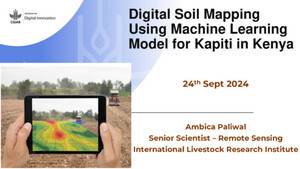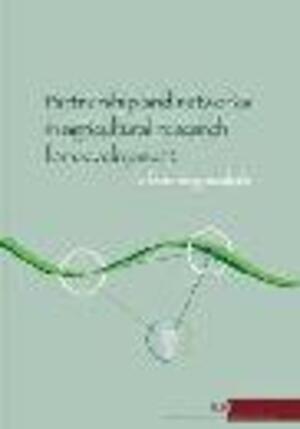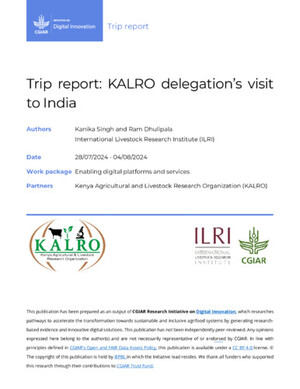
Bridging the gap between innovators and investors at Africa Climate Week
Catalyzing investment for sustainable livestock innovators
Across Africa Climate Week, hundreds of innovative ideas to counter climate change, support affected communities, and ensure climate mitigation were showcased across countless sessions. As stated by the UAE Minister of Climate Change and Environment Mariam Almheiri, “We have the innovations.” Evidently, it's not ideas that are lacking, but rather adequate funding to implement these novel initiatives.
To bridge this gap between innovators and investors, the International Livestock Research Institute (ILRI) hosted a session on 'catalyzing investment for sustainable livestock innovators.'
Increasing investments through the livestock solutions exchange
Todd Crane, the principal scientist at ILRI, began the session by introducing the soft launch of the Livestock Solutions Platform, a collaborative venture between the Gates Foundation and ILRI. Kirstin Grote Girvetz, Director of AgThrive, followed suit, outlining the critical role this solutions exchange platform will play in connecting innovators with investors. This is especially crucial in the context of livestock solutions, a significantly underfunded area.
Girvetz emphasized that "increasing funding in the livestock sector can significantly improve food and nutrition security, employment, gender equality, and drive inclusive growth."
Furthermore, increased investment can mitigate the adverse impacts of the livestock sector, such as greenhouse gas emissions.
To boost investment, the Livestock Solutions Exchange has set a three-year goal, focusing on highlighting "investable" livestock solutions, enhancing capacity to secure funding or financing, and bridging the gap between donors and innovators. This approach aims to counter the current scenario where investments are often made haphazardly, without adequately identifying effective and sustainable innovations. Consequently, the Livestock Solutions Platform seeks to create a streamlined path from investors to innovators, with a significant emphasis on involving 40% female innovators. The initiative will begin by operating in Kenya during the first year, expanding to Tanzania in the second, and commencing operations in Ethiopia during the third year. To support livestock systems innovators and enhance their ability to present their innovations effectively to potential donors and investors, the Livestock Solutions Platform will focus on building innovators' understanding of investor preferences, enhancing their capacity to market their solutions, and offering support for pitch development.
Pitches from four promising innovators
InsectiPro’s black flies for the future
The first innovator to take the stage was Talash Huijbers, CEO of InsectiPro. Founded in 2015, InsectiPro aims to address two major challenges facing Africa in the coming decade: food production and waste management. Huijbers explained the interconnected nature of these challenges. To tackle both simultaneously, InsectiPro utilizes insects to create circular, sustainable, nutritious, and profitable systems that can transform existing food systems and value chains. The company grows black soldier flies using low-tech production processes to produce alternative protein sources for the feed industry. Moreover, these flies feed on community waste, not only reducing waste but also mitigating the environmental impact of open dumping and CO2 emissions.
InsectiPro has experienced many successes, including training 2000 farmers, providing cricket-based porridge to 300 school-aged children, and improving fish quality by 37% through black fly feed. With increasing acceptance of insect-derived protein as an alternative to imports by feed millers, InsectiPro aims to expand its operations to six countries by 2026, upcycling over 720,000 MT of waste to feed 54 million chickens annually and covering more than 78,000 acres with biofertilizer. This ambitious endeavor could save 450,000 MT of CO2. To achieve these goals, InsectiPro is seeking a $4,888,000 investment.
Locating private sector funding for quality forages
Solomon Mwendia, representing the Alliance of Biodiversity & CIAT, discussed the potential of quality forages. Mwendia highlighted that millions of market-oriented dairy farmers and emerging pig and beef fattening operations are eager to adopt improved forages. However, they face difficulties in accessing quality planting materials and information on forage production, purchase, and sale. This shortage in supply has led to rising seed prices and the urgent need for new investments.
Mwendia proposed a solution centered on private-sector-led growth, supported by research and development efforts aimed at unlocking the potential of quality forages. This involves introducing, testing, producing, and distributing hybrid and improved varieties of forages. The multifaceted solution also encompasses pipeline development, catalyzing efficient seed systems, farmer education, business incubation, policy support, and further research. Already impacting 50,000 smallholder farms and 19,763 hectares of land, the Alliance for Biodiversity & CIAT now seeks a five-year investment of $5.5 million to expand its initiatives and benefit over 1 million people.
Supporting farmers with high-quality tractors
Jehiel Oliver, CEO of Hello Tractor, presented an innovative approach to providing technology to farmers. Hello Tractor has developed a mobile application that allows community-based agents to aggregate and book services on behalf of farmers and their communities while earning a commission. Through the app, tractor owners can efficiently manage all aspects of operators, tractors, and bookings. Hello Tractor has successfully financed over 100 tractors through a new pay-as-you-go initiative.
In Kisumu, Kenya, Hello Tractor operates a hub where farmers can access rentals, trained technicians, spare parts, quality seeds, fertilizers, and farming education using demonstration plots.
Oliver emphasized that "solutions start with smallholder farmers," and this rental program helps alleviate financial barriers.
To support the growth of Hello Tractor in the coming year, Oliver requested a $3.9 million investment.
Breeding high-quality animals in the horn of Africa
Chip Stem, CEO of Livestock Trade Services (LTS), brings a unique blend of biology, veterinary expertise, and economics to his innovation. Stem's vision is to empower 40 million pastoralists in the Horn of Africa by establishing a value-based marketplace that assesses animals based on individual quality, rather than mass sourcing. He emphasized that the livelihoods of these pastoralists, many of whom are women, have historically been marginal and are now further threatened by climate change.
Currently, animals in the region are sourced rather than bred, leading to inefficiencies. LTS aims to reduce the time to market weight per animal from four years to one, significantly cutting lifetime methane emissions by 85 to 97% by year 5 and achieving carbon neutrality by year 10. This ambitious plan would reduce CO2 emissions by 75% in year 5, saving 1.8 million tons annually and tripling pastoral incomes. To realize these transformative outcomes, LTS requires a substantial $15 million investment.
Pitch feedback from the experts
Wycliffe Bitta, Senior Investment Manager at Goodwell, and Shruthi Baskaran-Makanju, Partner at the Boston Consulting Group, offered constructive feedback for each pitch. Bitta stressed the importance of thinking about the scalability of impact and the ability to attract funds beyond donor funding. He also emphasized the need to understand the size of the market and how investments would propel the projects from one stage to the next.
Baskaran-Makanju urged innovators to consider feasibility, assessing whether the market is currently ready for their solution. She emphasized the importance of execution capabilities and emphasized that the focus should not be on isolated solutions but on transforming entire systems.
Increasing innovator-investor contact in the future
The Livestock Solutions Exchange has set the stage for a promising future where innovative solutions to critical agricultural challenges can gain significant funding. By bridging the gap between innovators and investors, ILRI's Livestock Solutions Platform aims to ensure that impactful organizations and businesses receive the financial support they need to scale up operations and reach more people. The success of these innovations holds the key to addressing pressing issues such as food security, environmental sustainability, and economic development. To successfully implement the innovations that will improve and save lives across the African continent, increasing investment flows is, and will continue to be, critical.
Banner photo: the panelists discussing investable livestock solutions (credit: Fenja Tramsen/ ILRI)
















